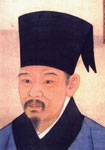“兼擅鱼鸟两所娱”的意思及全诗出处和翻译赏析
“兼擅鱼鸟两所娱”全诗
轻舟沿泝穷远近,肩舆上下更传呼。
翩然独往不携孥,兼擅鱼鸟两所娱。
困依岩石坐巉绝,行牵翠蔓随缠纡。
道逢懃思访其庐,诵诗清切秋蝉孤。
隐居羞踏陌上土,何人起爱轮下蒲。
水南巷中罗百夫,鸡鸣朝谒至日晡。
人生变化安可料,怜汝久遁终无图。
凫鷖不足鹤有余,一俯一仰戚与蘧。
嗟我久欲从逃逋,方圆不敢左右摹。
作者简介(苏辙)

苏辙(1039—1112年),字子由,汉族,眉州眉山(今属四川)人。嘉祐二年(1057)与其兄苏轼同登进士科。神宗朝,为制置三司条例司属官。因反对王安石变法,出为河南推官。哲宗时,召为秘书省校书郎。元祐元年为右司谏,历官御史中丞、尚书右丞、门下侍郎因事忤哲宗及元丰诸臣,出知汝州,贬筠州、再谪雷州安置,移循州。徽宗立,徙永州、岳州复太中大夫,又降居许州,致仕。自号颍滨遗老。卒,谥文定。唐宋八大家之一,与父洵、兄轼齐名,合称三苏。
《次韵子瞻游孤山访惠懃惠思》苏辙 翻译、赏析和诗意
《次韵子瞻游孤山访惠懃惠思》是宋代苏辙创作的一首诗词。以下是该诗的中文译文、诗意和赏析:
鸟依山,鱼依湖,
But all things exist and yet do not exist.
Birds dwell on mountains, fish reside in lakes,
Yet everything is both present and absent.
轻舟沿泝穷远近,
A light boat travels along the winding river,
Exploring the vastness of distance.
肩舆上下更传呼。
Carriages passing by call out to each other.
翩然独往不携孥,
Gracefully and alone, I go without my children,
Enjoying the company of birds and fish.
兼擅鱼鸟两所娱。
I indulge in the pleasures of both birds and fish.
困依岩石坐巉绝,
I find myself trapped, sitting on a rugged cliff,
Surrounded by entangled vines.
行牵翠蔓随缠纡。
As I walk, I am entwined by the emerald vines that follow.
道逢懃思访其庐,
Along the way, I encounter the hermitage of Huiqin,
And visit him, lost in contemplation.
诵诗清切秋蝉孤。
Reciting poetry, his voice is clear and distinct, like the lonely autumn cicada.
隐居羞踏陌上土,
Hidden away, he avoids stepping on the common path,
Shunning the mundane affairs of the world.
何人起爱轮下蒲。
Who will rise to appreciate the humble reeds beneath the wheel?
水南巷中罗百夫,
In the lanes of Shuinan, there are numerous attendants,
And the crowing of the rooster greets the morning until dusk.
鸡鸣朝谒至日晡。
From dawn till dusk, they pay their respects.
人生变化安可料,
The changes in life are unpredictable,
No one can foresee what lies ahead.
怜汝久遁终无图。
I pity you, who have long sought seclusion but remain without a plan.
凫鷖不足鹤有余,
While there may be a scarcity of mandarin ducks and egrets,
There is an abundance of ducks and quails.
一俯一仰戚与蘧。
One bows, the other raises its head, the sorrows and joys of life.
嗟我久欲从逃逋,
Alas, I have long desired to escape and flee,
But hesitate to move in any direction.
方圆不敢左右摹。
I dare not imitate or conform to the norms of the world.
这首诗词以自然景物、游览和思考为主题,描绘了作者在孤山游玩时的所见所感。诗中通过描述鸟、鱼、船、山、湖等元素,表达了一种超越现实的境界,以及人与自然的和谐共生。同时,诗人通过表现自己与人世的疏离和对隐士生活的向往,展现了对自由与追求内心平静的渴望。整首诗以平淡自然的语言,通过对景物的描写和对内心的思考,传达了一种超脱尘世的意境,表达了对人生变幻无常和追求内心自由的思考。
“兼擅鱼鸟两所娱”全诗拼音读音对照参考
cì yùn zi zhān yóu gū shān fǎng huì qín huì sī
次韵子瞻游孤山访惠懃惠思
niǎo yī shān, yú yī hú, dàn yǒu suǒ yǒu wú suǒ wú.
鸟依山,鱼依湖,但有所有无所无。
qīng zhōu yán sù qióng yuǎn jìn, jiān yú shàng xià gèng chuán hū.
轻舟沿泝穷远近,肩舆上下更传呼。
piān rán dú wǎng bù xié nú, jiān shàn yú niǎo liǎng suǒ yú.
翩然独往不携孥,兼擅鱼鸟两所娱。
kùn yī yán shí zuò chán jué, xíng qiān cuì màn suí chán yū.
困依岩石坐巉绝,行牵翠蔓随缠纡。
dào féng qín sī fǎng qí lú, sòng shī qīng qiē qiū chán gū.
道逢懃思访其庐,诵诗清切秋蝉孤。
yǐn jū xiū tà mò shàng tǔ, hé rén qǐ ài lún xià pú.
隐居羞踏陌上土,何人起爱轮下蒲。
shuǐ nán xiàng zhōng luó bǎi fū, jī míng cháo yè zhì rì bū.
水南巷中罗百夫,鸡鸣朝谒至日晡。
rén shēng biàn huà ān kě liào, lián rǔ jiǔ dùn zhōng wú tú.
人生变化安可料,怜汝久遁终无图。
fú yī bù zú hè yǒu yú, yī fǔ yī yǎng qī yǔ qú.
凫鷖不足鹤有余,一俯一仰戚与蘧。
jiē wǒ jiǔ yù cóng táo bū, fāng yuán bù gǎn zuǒ yòu mó.
嗟我久欲从逃逋,方圆不敢左右摹。
“兼擅鱼鸟两所娱”平仄韵脚
平仄:平仄平仄仄仄平
韵脚:(平韵) 上平七虞 * 平仄拼音来自网络,仅供参考;诗句韵脚有多个的时候,对比全诗即可判断。
“兼擅鱼鸟两所娱”的相关诗句
“兼擅鱼鸟两所娱”的关联诗句
网友评析
- “无哗观者也深衣”的意思及全诗出处和翻译赏析
- “古典如迂效颇奇”的意思及全诗出处和翻译赏析
- “放出曦轮行事日”的意思及全诗出处和翻译赏析
- “飞来捷帜序宾时”的意思及全诗出处和翻译赏析
- “家学存斋授”的意思及全诗出处和翻译赏析
- “渊源自晦庵”的意思及全诗出处和翻译赏析
- “魁文行海内”的意思及全诗出处和翻译赏析
- “师道重天南”的意思及全诗出处和翻译赏析
- “衔未冰条一”的意思及全诗出处和翻译赏析
- “州才刀梦三”的意思及全诗出处和翻译赏析
- “芳名却千载”的意思及全诗出处和翻译赏析
- “俎豆拜祠龛”的意思及全诗出处和翻译赏析
- “义重人谁及”的意思及全诗出处和翻译赏析
- “高风有古人”的意思及全诗出处和翻译赏析
- “己田分友子”的意思及全诗出处和翻译赏析
- “黎事保羁臣”的意思及全诗出处和翻译赏析
- “抱负耕莘志”的意思及全诗出处和翻译赏析
- “依稀陋巷仁”的意思及全诗出处和翻译赏析
- “丹青遗像在”的意思及全诗出处和翻译赏析
- “难写道心真”的意思及全诗出处和翻译赏析
- “丈席即之温”的意思及全诗出处和翻译赏析
- “终身佩一言”的意思及全诗出处和翻译赏析
- “栋樑失安定”的意思及全诗出处和翻译赏析
- “山斗惨韩门”的意思及全诗出处和翻译赏析
- “金兰益友真同志”的意思及全诗出处和翻译赏析